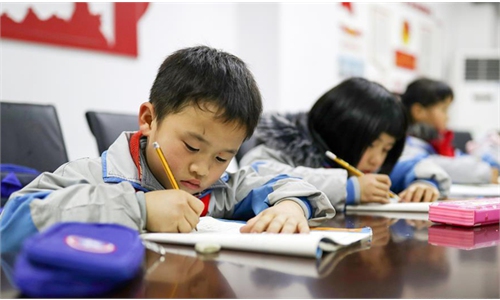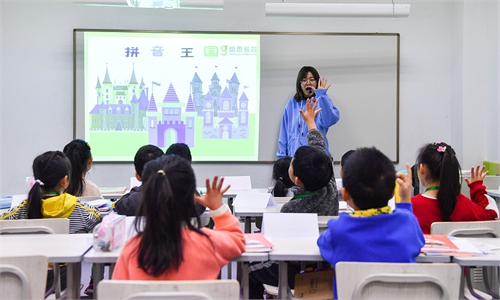
Yuanfudao's headquarters in Beijing Photo: VCG
Chinese live tutoring app Yuanfudao on Wednesday launched a new online education product called "Pumpkin Science" that focuses on science education for juveniles, as the company shifts from traditional curriculum-based courses to other subjects after China banned for-profit after-class tutoring in sweeping overhaul of the $120 billion industry.
Experts said that Yuanfudao and other online tutoring companies in China have to put their focus on adjusting their model, now that their major business is banned by the new regulation. Because of these companies' financial strength, their role as Chinese online tutoring giants won't change.
According to Yuanfudao, the Pumpkin Science product provides various levels of online scientific courses for juveniles, as well as allowing them to conduct science experiments with tools designed by the company.
It is also China's first science education product that uses artificial intelligence, which enables children to adjust their learning pace with the help of voice interaction.
The company's launch of the non-curriculum education product was deemed as a transition in response to China's sweeping reform of its private tutoring market to ease students' burden. Under new policy guidelines announced recently, all tutoring institutions on the school curriculum will be registered as non-profit organizations. The country also bans curriculum-based tutoring institutions from going public for financing or receiving foreign investment.
The policy shift came as a big shake-up for China's online tutoring firms, some of which are listed on the US stock markets. The shares of New Oriental Education, for example, fell to $2.19 on Tuesday, down about 73 percent from one month ago.
Independent tech analyst Liu Dingding told the Global Times that online tutoring companies were not motivated to develop non-curriculum study products in the past, but now they have to direct 100 percent of their energy to those products as a result of the policy change.
"I am cautiously optimistic about their success, as they have much more capital and resources to make such transitions than smaller companies," Liu said.
He predicted that apart from a few first-tier companies, which he said will retain a leading role, there will be new companies emerging in the first league - especially those that specialize in arts training courses like piano and dance.




